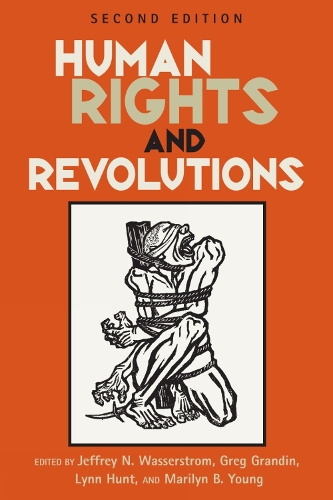
Human Rights and Revolutions
(Paperback, Second Edition)
Publishing Details
Human Rights and Revolutions
By (Author) Jeffrey N. Wasserstrom
Edited by Greg Grandin
Edited by Lynn Hunt
Edited by Marilyn B. Young
Bloomsbury Publishing PLC
Rowman & Littlefield Publishers
15th May 2007
Second Edition
United States
Classifications
Tertiary Education
Non Fiction
Revolutionary groups and movements
Revolutions, uprisings, rebellions
323
Physical Properties
Paperback
244
Width 154mm, Height 232mm, Spine 14mm
372g
Description
Now in a revised and updated edition with added original chapters, this acclaimed book provides an interdisciplinary perspective on the complex links between revolutionary struggles and human rights discourses and practices. Covering events as far removed from one another in time and space as the English Civil War, the Parisian upheavals of 1789, Latin American independence struggles, and protests in late twentieth-century China, the contributors explore the paradoxes of revolutionary and human rights projects.
The book convincingly shows the ways in which revolutions have both helped spur new advances in thinking about human rights and produced regimes that commit a range of abuses. Providing an unusually balanced analysis of the changes over time in conceptions of human rights in Western and non-Western contexts, this work offers a unique window into the history of the world during modern times and a fresh context for understanding today's pressing issues.
Contributions by: Florence Bernault, Mark Philip Bradley, Sumit Ganguly, Greg Grandin, James N. Green, Lynn Hunt, Yanni Kotsonis, Timothy McDaniel, Kristin Ross, Jeffrey N. Wasserstrom, Alexander Woodside, Marilyn B. Young, David Zaret, and Michael Zuckert
Reviews
This book is a necessary addition to a research collection, because it provides a comprehensive framework and well chosen set of cases to illustrate the state of the art of the major debates in the human rights field. * H-Net: Humanities and Social Science Reviews Online *
The authors argue convincingly that without revolutions human rights would never have become a political reality, even though countries that never have had a revolution have done a better job of preserving freedom. Many of the essays are interrelated in that they illustrate one or another or both of these themes. On the whole, this is an interesting, worthwhile, and thought-provoking book. Social and political philosophers might gain a great deal from understanding the history of the concepts that they use and argue about. -- Robert van Wyk * Human Rights Revolution *
A noteworthy contribution to our understanding of the complexities involved in the human rights discourse. * International Relations *
This is an excellent collection on an important topic. The contributions cover an admirably diverse set of times and places. * American Historical Review *
Altogether, we have here an exemplary set of thoughtful, erudite, and often provocative essays that provides readers with a rich and profound understanding of immensely important and complex issues. * Contemporary Sociology *
There are some astute insights in this volume. * American Journal of Islamic Social Studies *
This is a fine collection of thirteen essays on human rights, each of which can stand on its own, and each author displays impeccable credentials. Together, they have much to offer. * Journal of World History *
The rise to prominence of human rights discourse carries much promise, as well as grave threats, in the context of structures of power and dominance. These searching, thoughtful, and highly informative essays inquire into the nature and origin of human rights from varied perspectives, unraveling intricate and often conflicting strands of history, practice, and doctrine. The collection is an impressive contribution to understanding and should be a valuable guide to constructive action as well. -- Noam Chomsky, Laureate Professor, University of Arizona
This elegant, wide-ranging collection of essays thoughtfully explores the origins, evolution, and contemporary significance of human rights and provides a much-needed, deeply analytical guide to understanding how to interpret today's debates. Everyone who cares should read it; everyone will learn something new. -- Daniel Chirot, University of Washington
This is an exemplary collection of essays by a wonderfully diverseboth in their disciplines and their opinionsgroup of scholars and intellectuals. They demonstrate, above all, that strenuous historical analysis can light up the contemporary political world. -- Michael Walzer, Institute for Advanced Study, Princeton University
Author Bio
Jeffrey N. Wasserstrom is professor of history at the University of California, Irvine. Greg Grandin is professor of history at New York University. Lynn Hunt is Eugen Weber Professor of French History at the University of California, Los Angeles. Marilyn B. Young is professor of history at New York University.
